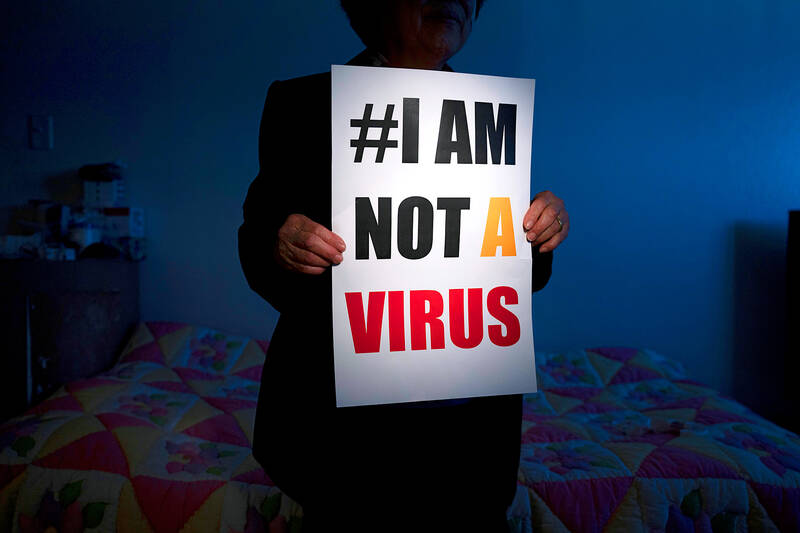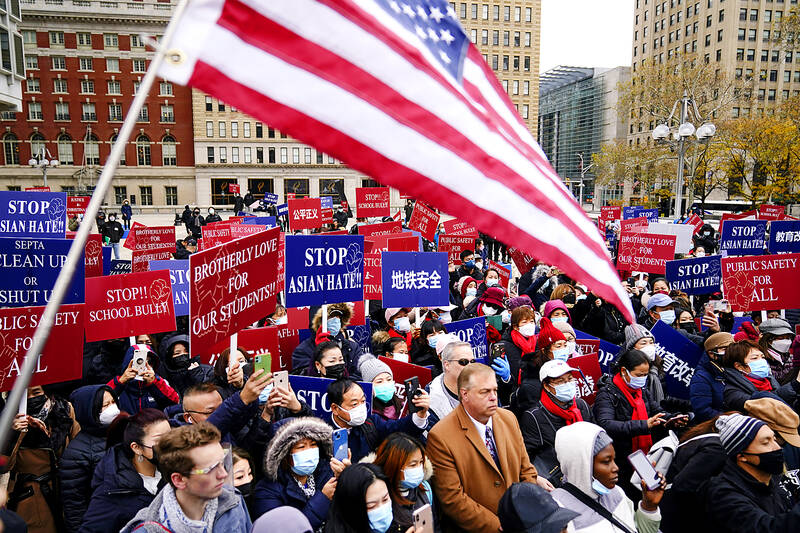Up until 2020, Anna Wong had gone her entire adulthood in Los Angeles without ever facing blatantly racist abuse for being Asian. After COVID-19 hit, she was accosted twice in six months.
The first time, she was browsing an aisle in Bed Bath & Beyond when a white, 30-something woman suddenly yelled: “Six feet away from me, you Chinese witch!”
A shaken Wong left the store, the woman still yelling after her. The second time, Wong was walking her dog when a passenger in a car — a young Hispanic man — screamed at her “Thanks for ruining the world,” followed by an ethnic slur.

Photo: AP
“The first, second year of the pandemic, I do distinctly remember thinking ... I was very nervous to go out,” said Wong, who did not report the incidents to police. “Am I going to draw attention to the fact that I’m Asian?”
It seemed unfathomable she was facing such anti-Asian vitriol nearly a century after her aunt, pioneering movie star Anna May Wong, dealt with constant racial discrimination.
It was five years ago that pandemic-fueled abuse of Asian Americans and Pacific Islanders became so frequent — reports spiked 35 percent from March 2020 to the end of 2021 — that a reporting center was formed. Stop AAPI Hate legitimized fears of a concurrent pandemic of xenophobia. The group’s data prompted national legislative action, including the COVID-19 Hate Crimes Act, and galvanized advocacy among young people within the Asian American community.

Photo: AP
NEW CONCERNS
Five years later, Stop AAPI Hate is receiving fewer incident reports yearly but they’re still happening by the hundreds and are likely an undercount. Now, those still fighting anti-Asian hate are worried it will only intensify in a political climate of immigration crackdowns, English-only mandates and bans on DEI initiatives.
During President Donald Trump’s first term, many partially blamed him for framing COVID-19 with racist language. Trump said his remarks were “not racist at all.” Now, there is concern not just about hate but erasure of Asian American and Pacific Islander history and culture. For example, this month the Pentagon mistakenly took down Web pages honoring Japanese American servicemen.
“What’s the opposite of diversity? It’s segregation or re-segregation,” Manjusha Kulkarni, Stop AAPI Hate co-founder, said, referring to Trump’s policies so far. “They want to put us — people of color, women, LGBTQ — sort of back in our ‘place,’ which means not with access to jobs or housing or ability to celebrate our holidays.”
STOP AAPI HATE
Kulkarni, executive director of the AAPI Equity Alliance, Cynthia Choi of Chinese for Affirmative Action, and San Francisco State University professor Russell Jeung came together in 2020 after a Los Angeles teen of Asian descent was assaulted at school. They solicited accounts of hate acts from victims, even those not legally hate crimes. They received a barrage.
“We said ‘Well, the first thing we need to know and understand is how big of a problem is this,’” Kulkarni said, adding that she will be eternally grateful that people responded. “That helped us to know what was going on.”
Besides federal hate crimes legislation, Stop AAPI Hate’s data led to the passing of three California bills. These included expanding civil rights protection in public spaces and studying hate-driven harassment on public transit. They’ve also attempted social media campaigns like “Spread AAPI Love,” the opposite of their moniker.
Even though the pandemic has abated, their data shows racism prevails. From March 2020 to the end of 2023, Stop AAPI Hate collected over 12,000 reports though they believe it’s likely an undercount. Over 700 occurred in 2023. Figures for 2024 will be released in May.
Also in 2023, an AAPI Data and Associated Press-NORC poll found a third of Asian Americans and Pacific Islanders say they have experienced an act of abuse based on their race or ethnicity in the last year.
An FBI analysis from that year found out of 7,049 reported hate crime offenses motivated by race, ethnicity or ancestry, 6.6 percent involved anti-Asian bias. Kash Patel, the first person of color and Asian American to be agency director, talked about being subjected to racism during his confirmation hearing.
ACTIVISM
There was a groundswell of Asian American activism after 2020, according to Stop AAPI Hate. Their 2023 report found nearly 3 in 4 Asian American and Pacific Islander adults participated in activities to reduce or resist racism.
William Diep, who was 16 in 2020, was disturbed by attacks he heard about in New York City. So he started a campaign, “Virus: Racism.” He virtually gathered testimonies from young people about anti-Asian encounters. The project deeply affected him.
“I learned to stick up for people,” said Diep, now a senior at Columbia University.
He wonders how advocates can navigate the current political climate and if government resources such as translations or race-based census research will be eliminated.
“I’m scared that there’s no one to protect Asian Americans,” Diep said. “I think Asian Americans protect each other, but I question the infrastructure that exists to protect our rights and our heritage.”
Stop AAPI Hate does rely on some federal funding. Ideally, neither the government nor any other outside force will be able to dictate or hamper the organization’s work.
“We hope not. I mean, we’re fighting as hard as we can,” Kulkarni said.
Now, the coalition’s focus has expanded to include educating people about issues like birthright citizenship, cultural school curriculum and immigrants’ rights. Some Asian legal U.S. residents say they are being targeted for deportation.
“I hope and strongly believe that our communities are stronger, that we’re more equipped to handle the challenges of today, which are even more significant than they were in 2020,” Kulkarni said. “We were built for this and our values remain the same.”

During the Metal Ages, prior to the arrival of the Dutch and Chinese, a great shift took place in indigenous material culture. Glass and agate beads, introduced after 400BC, completely replaced Taiwanese nephrite (jade) as the ornamental materials of choice, anthropologist Liu Jiun-Yu (劉俊昱) of the University of Washington wrote in a 2023 article. He added of the island’s modern indigenous peoples: “They are the descendants of prehistoric Formosans but have no nephrite-using cultures.” Moderns squint at that dynamic era of trade and cultural change through the mutually supporting lenses of later settler-colonialism and imperial power, which treated the indigenous as

By 1971, heroin and opium use among US troops fighting in Vietnam had reached epidemic proportions, with 42 percent of American servicemen saying they’d tried opioids at least once and around 20 percent claiming some level of addiction, according to the US Department of Defense. Though heroin use by US troops has been little discussed in the context of Taiwan, these and other drugs — produced in part by rogue Chinese Nationalist Party (KMT) armies then in Thailand and Myanmar — also spread to US military bases on the island, where soldiers were often stoned or high. American military policeman

An attempt to promote friendship between Japan and countries in Africa has transformed into a xenophobic row about migration after inaccurate media reports suggested the scheme would lead to a “flood of immigrants.” The controversy erupted after the Japan International Cooperation Agency, or JICA, said this month it had designated four Japanese cities as “Africa hometowns” for partner countries in Africa: Mozambique, Nigeria, Ghana and Tanzania. The program, announced at the end of an international conference on African development in Yokohama, will involve personnel exchanges and events to foster closer ties between the four regional Japanese cities — Imabari, Kisarazu, Sanjo and

The Venice Film Festival kicked off with the world premiere of Paolo Sorrentino’s La Grazia Wednesday night on the Lido. The opening ceremony of the festival also saw Francis Ford Coppola presenting filmmaker Werner Herzog with a lifetime achievement prize. The 82nd edition of the glamorous international film festival is playing host to many Hollywood stars, including George Clooney, Julia Roberts and Dwayne Johnson, and famed auteurs, from Guillermo del Toro to Kathryn Bigelow, who all have films debuting over the next 10 days. The conflict in Gaza has also already been an everpresent topic both outside the festival’s walls, where